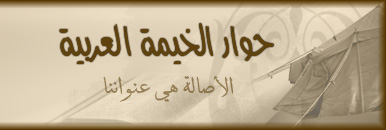|
مجلة الخيمة
 حوار الخيمة حوار الخيمة
 دليل المواقع دليل المواقع
 نخبة المواقع نخبة المواقع
 Muslim Tents Muslim Tents
|
التسكين المجاني
 التسكين المدفوع التسكين المدفوع
 سجلات الزوار سجلات الزوار
 بطاقات الخيمة بطاقات الخيمة
 للإعلان في الخيمة للإعلان في الخيمة
|
| الأسئلة الشائعة | قائمة الأعضاء | التقويم | البحث | مواضيع اليوم | جعل جميع المنتديات مقروءة |
|
#1
|
|||
|
|||
|
Nicolas Pelham in Damascus
Sunday May 6, 2001 The Observer After an angry visit to Greece, the frail Pope John Paul II is now accused of bringing Christianity by stealth to one of Islam's most important holy sites. His visit today to the historic Umayyad mosque in Damascus looks set to spark controversy. It is the first time a pontiff has entered a mosque. Muslim leaders preparing to receive the Pope have demanded that he remove his cross, saying the crucifix is an insult to Islam. They also want him to say sorry for the Crusades, following his dramatic apology in Athens on Friday for the 'sins' committed by the Roman Catholic Church against its Orthodox brethren. 'In a Muslim state, crucifixes should not be brandished in public, all the more so inside the holy place of Islam,' said Sheikh al-Hout, of the nearby Amara mosque. 'The Pope must respect these conditions like anyone else.' Islam recognises Jesus as a prophet, but claims he never died on the cross. The Catholic bishop organising the papal visit, Izidore Battikha, dismissed the demands as the fuming of fanatics. 'There will be no apology, and the cross will be prominent on the Pope's vestments when he enters the mosque,' he said. Hundreds of thousands of Syrians are set to pack the biblical Straight Street in Damascus, where St Paul converted to Christianity, to watch the Popemobile enter the Umayyad mosque. Syria's authorities are ruling out public protests. Demonstrations are banned under Syria's 40-year-old martial law. But away from the state fanfare, Muslim preachers across Syria have questioned the Pope's motives for choosing the Umayyad mosque, which 1,400 years ago was a Byzantine cathedral and still houses the tomb of St John the Baptist. The Vatican's refusal to apologise for Christian aggression against Muslims has fuelled fears that the Pope may be seeking to revive the millennial battle for control of the holy places, rather than looking for reconciliation with Islam. 'History teaches us that Western pilgrimages have covert political motives,' said Dr Bouti, Syria's leading Sunni preacher. He joined other standard-bearers of conservative Islam to block the Vatican's attempt to hold a common Christian-Muslim prayer in the mosque. 'Would the Pope let us give the Muslim call to prayer at St Peter's?' asked al-Hout, as policemen with Kalashnikovs patrolled the gates. In other Friday prayers on the eve of the Pope's visit, Muslim leaders reiterated that the Pope was following less in the footsteps of St Paul than those of the crusaders a 1,000 years later. Where Catholic knights came with arms to plant crosses atop Syria's mosques 900 years ago, they said, Pope John Paul II was using stealth. Some asked why the Pope had chosen to make his first mosque appearance in Syria - a country whose leaders belong to the heterodox Alawite sect and are regarded by Sunnis as non-Muslims. The growing Sunni dissent fuels fears of a new challenge for President Bashar Assad as he seeks to consolidate the hold of his Alawite sect over Syria after his father's death last June. Syrians say it marks the first public Sunni opposition since Bashar's father, Hafez Assad, used tanks to crush the Muslim Brotherhood in a month-long massacre in 1982. Rome has done little to dampen fears that the hoped-for rapprochement between Islam and Christianity has been scuttled. The Vatican has shrugged off Syrian invitations to visit the tomb of Saladin, whose tomb lies a few yards from Umayyad mosque, saying the Pope did not visit unholy places. Monsignor Michael Fitzgerald, a Vatican expert on Islamic affairs, also put paid to Muslim hopes that the Pope's entrance into a mosque - which comes more than 20 years after he entered a synagogue - marked a landmark on the road to Catholic recognition of the sanctity of Islam. Fitzgerald said the Pope's main purpose in visiting the mosque was to see St John the Baptist's tomb, which remains a pilgrimage site for Muslims. In addition to the tomb, a Greek engraving to the 'coming Kingdom of Christ' in the mosque walls, and a minaret called Jesus still survive as testaments to the Umayyad mosque's Christian past. Last year Pope John Paul II, whose predecessor Pope Urban II launched the Crusades with a call in 1095 to 'exterminate this vile race from our lands', begged forgiveness for the sins and faults committed or condoned by the Church in the past 2,000 years. But while he apologised to Jews, Gypsies and women, Vatican conservatives forced him to ditch mention of either Muslims or the Crusades. 'More than any other group, Muslims have been victimised by Christians,' protested Syria's Grand Mufti, Sheikh Ahmed Kuftaro. Guardian Unlimited © Guardian Newspapers Limited 2001
__________________
{أَفَمَنْ يَمْشِي مُكِبًّا عَلَى وَجْهِهِ أَهْدَى أَمَّنْ يَمْشِي سَوِيًّا عَلَى صِرَاطٍ مُسْتَقِيمٍ} [الملك/22] |
 |
«
الموضوع السابق
|
الموضوع التالي
»
| عدد الأعضاء الذي يتصفحون هذا الموضوع : 1 (0 عضو و 1 ضيف) | |
| خيارات الموضوع | بحث في هذا الموضوع |
| طريقة العرض | |
|
|

.gif)





 النمط الخطي
النمط الخطي

